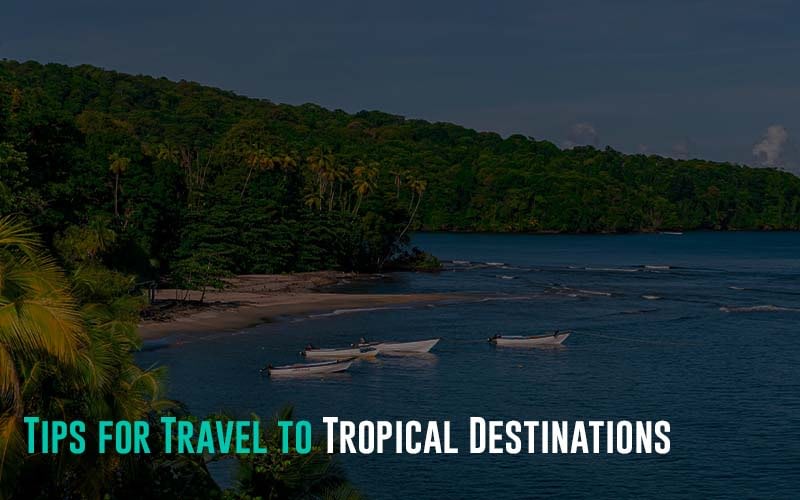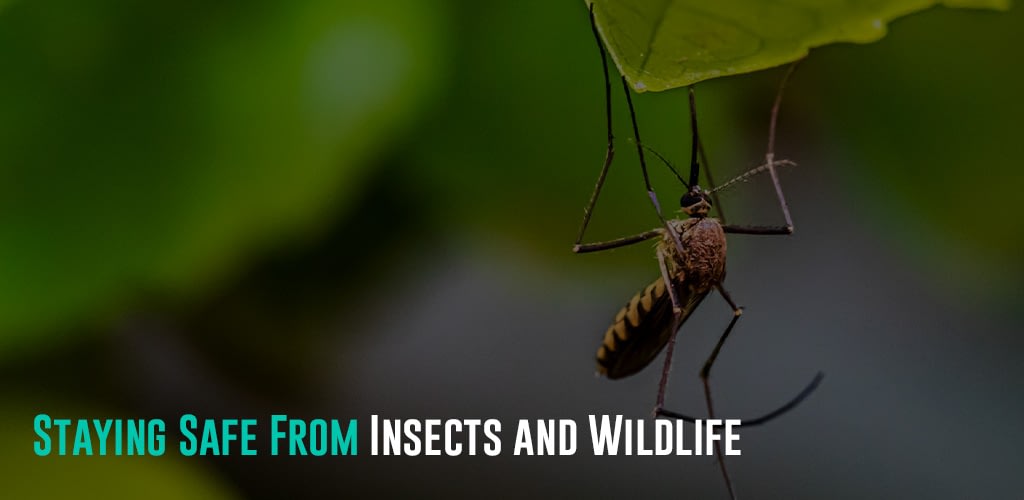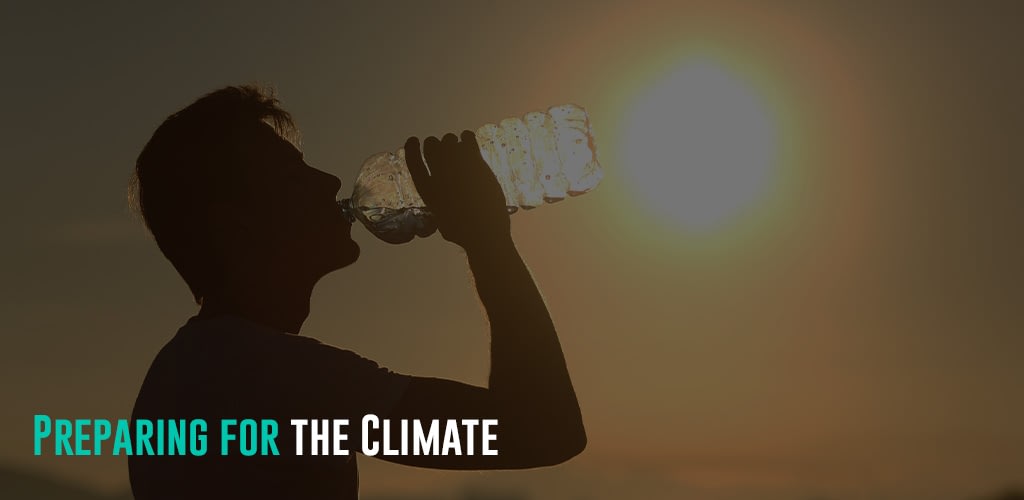Palm trees swing in the breeze. Crystal clear waters in shades of blue and green. Warm, sandy beaches that look to go on forever. The tropical destinations of our dreams hold so much charm. But before you grab your sunscreen and bathing suit and jet off to a tropical paradise, it’s important to properly prepare for the unique challenges these destinations can present.
With their intoxicatingly balmy climates, abundance of wildlife, and laid back vibes, the tropics offer an escape from the mundane like no other. But this thrilling paradise can catch unprepared travelers off guard. Between venomous creatures lurking unseen, oppressive heat and humidity, and the risk of unfamiliar Water-borne diseases, a lack of preparation can quickly turn a tropical vacation from heavenly to downright miserable.
The good news is that with some advanced planning and preventative care, you can sit back with peace of mind and fully soak up all the pleasures of the tropics. Here, we’ll go over everything you need to know to prepare your mind, body, and belongings for safe and comfortable travel to tropical destinations. By following these tips, you’ll be ready to make the most of your time in tropical paradise. The dazzling azure waters and balmy sea breezes await!
Featured Image Source
What to Pack
Heading off on a tropical getaway requires some special considerations when it comes to packing. You’ll want to bring gear that keeps you cool, comfortable, and protected from the elements.
- Lightweight, breathable clothing: Skip the heavy jeans and sweaters and opt for lightweight, breathable fabrics like linen, rayon, and cotton. Tank tops, shorts, skirts, and pants in these fabrics will help keep you cool.
- Swimwear: Don’t forget the bathing suits! Bring multiple swimwear options so you can alternate between wet and dry suits. Rash guards and swim shirts provide sun protection.
- Sun protective clothing and hats: Shield your skin from the intense tropical sun. Pack sun protective shirts, UV blocking hats, etc.
- Lightweight rain jacket: Brief tropical downpours are common. A thin rain jacket or poncho can keep you dry.
- Sturdy sandals: Bring sandals that can get wet and dry quickly. Water shoes work well for activities like hiking to waterfalls.
- Insect repellent: Defend yourself against mosquitoes, which can carry diseases like malaria, dengue, and Zika. Sprays, wipes, and wearable repellents are smart options.
- Water filter/purification tablets: Many regions have unsafe tap water. Use a filter or purification tablets to treat water.
- Moisturizer/after sun care: The tropical sun and humidity can dry out skin. Bring moisturizing lotion and soothing aloe vera gel.
- Lightweight towel: A microfiber travel towel takes up little space while absorbing water and drying quickly.
- Medications: Pack prescription meds plus OTC remedies like antihistamines, antibiotics, anti-diarrheal meds, motion sickness meds, etc.
Proper packing takes the stress out of travel, so you can fully embrace the magic of the tropics. Focus on versatile, lightweight items that will keep you comfortable in the heat and protected from the sun and insects.
Immunizations and Medications
To stay healthy in the tropics, see your doctor 4-6 weeks before departure. They can advise on recommended vaccinations and medications based on your destination, activities, and medical history. Common tropical travel vaccinations include:
- Hepatitis A & B
- Typhoid
- Yellow Fever
- Malaria medications
- Rabies
- Japanese Encephalitis
You may also need medications to prevent traveler’s diarrhea, motion sickness, altitude sickness, etc. Bring copies of prescriptions and write down generic drug names in case you need a local replacement. Ask about carrying an antibiotic in case of an infection. Being proactive with vaccines, drugs, and your overall health is vital for tropical travel.
Staying Safe From Insects and Wildlife
The tropics teem with exotic creatures, which add to the adventure but can also pose risks if you’re unprepared. Follow these tips to safely share the habitat:
- Wear insect repellent and long, loose clothing to prevent mosquito repellents or tick bites that can transmit diseases. Check yourself thoroughly for ticks after hikes.
- Shake out clothing and shoes before putting them on to avoid unwelcome critters.
- Give wildlife a wide berth and be vigilant in high risk areas. Know what to do if you encounter venomous snakes, spiders, or marine life.
- Avoid swimming in fresh water to steer clear of parasites and predators.
- Travel with a first aid kit containing treatments for bites/stings. Antihistamines provide relief.
With proper precautions, you can marvel at the variety of exotic species that call the tropics home. Just be sure to admire wildlife from a safe distance!
Preparing for the Climate
The tropical climate brings concerns like heat, humidity, and intense sun. To stay safe and comfortable:
- Hydrate constantly with water and electrolyte drinks. The heat and humidity accelerate dehydration.
- Take frequent breaks in shaded areas when possible. Avoid overexertion.
- Use cooling products like portable fans, cooling towels, and UV protecting clothing.
- Apply and reapply sunscreen regularly, and wear sunglasses and hats. The tropical sun is powerful.
- Check the local weather before and during your trip. Prepare for tropical storms and monsoons.
A little preparation makes all the difference in preventing exhaustion, heat stroke, and sunburn. You’ll better enjoy the natural beauty when you’re protected from the climate.
Know About Local Transport
Learning the local transportation scene is key to getting around tropical destinations smoothly:
- Research options like public buses/trains, taxis,and domestic flights. Know the general costs.
- Consider hiring a private car and driver to facilitate customized exploration.
- Don’t drive yourself in chaotic traffic and unfamiliar conditions. Arrange an airport transfer.
- For public transit, keep valuables secure and watch your surroundings. Travel during daylight hours.
- When taking taxis, agree on the fare beforehand and make note of the car & driver details.
- Pack a small backpack as your daily bag for easy transport via public transit.
Having a handle on the transportation landscape will let you see more sights with less stress. You’ll avoid the hassle of confusion or exorbitant fees from unscrupulous operators.
Familiarize Yourself with Local Food
One of the joys of tropical travel is experiencing the flavorful local cuisine. Be prepared with knowledge about:
- Signature dishes and ingredients to try. Seek out food tours or cooking classes.
- Hygiene standards at restaurants and street food stalls. Know how to avoid contaminated food or water.
- Having small, frequent meals instead of heavy ones. This eases digestion in the heat.
- Being liberal with bottled water to stay hydrated and prevent intestinal issues.
- Carrying antidiarrheal medication and oral rehydration salts is a precaution.
- Knowing the signs of food poisoning and what to do. This includes drinking fluids and seeking medical treatment.
Arming yourself with savvy eating tips allows you to delve into tropical cuisines safely and joyfully. Your taste buds will thank you!
Learn Local Etiquette
Observing local etiquette earns respect and goodwill with residents. Useful tips include:
- Dress modestly when visiting religious sites and rural areas. Avoid skimpy beachwear.
- Use culturally appropriate greetings. Handshakes, slight bows, or palms together (“namaste”) are common.
- Ask before photographing people, as some cultures reject casual photography.
- Use your right hand for eating and gesturing, as the left hand has negative associations.
- Tipping is appreciated; check customary amounts for restaurants, taxis, guides, etc.
Making an effort to understand and follow etiquette shows your sincere interest in connecting with the local culture. Locals will appreciate your sensitivity and readiness to adhere to social norms.
When to Visit
- The dry season offers more ideal weather for travel, with warmer, sunny days and minimal rain.
- During the wet season, expect hot temperatures plus frequent downpours and storms. Some attractions may close.
- Hurricanes are a threat in late summer and fall. Avoid this period or purchase travel insurance.
- Peak season around December–April brings bigger crowds and higher prices.
- The shoulder seasons of spring and fall provide a balance with decent weather and smaller crowds.
Consider the weather patterns, potential risks from storms, and crowds when deciding on travel timing. With some strategic planning, you can experience the tropics at their best.
Conclusion
Getting ready for traveling to a tropical place is super important. You’ve got to pack smartly, think about your health, watch out for insects and animals, get used to the weather, learn about how to get around and eat safely, and pick the right time to go. By doing these things, you can make sure your vacation is awesome and safe. So, get ready to enjoy the beautiful beaches, tasty food, and fun adventures that the tropics have to offer!
This guide is more than just tips; it’s like having a travel buddy by your side. We’ve covered everything you need to know to plan your trip smoothly, from packing tricks to staying healthy. Join our community of travelers, and let’s explore tropical paradise together! With our trip planner, you can easily plan your India diving adventure. You can also see the community itineraries created by fellow travelers from various amazing places.
Whether you’re dreaming of sunny beaches or lush forests, we’re here to make sure your trip is unforgettable. Get ready to dive into your next adventure with confidence!
Start planning your trip now with Travel-Wise’s free trip-planning tools to have you on your way to your destination faster than ever!




